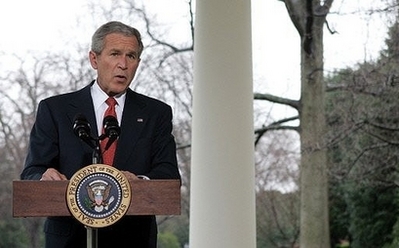Bush vetoes waterboarding bill
(Xinhua)
Updated: 2008-03-09 09:52
Updated: 2008-03-09 09:52
WASHINGTON - US President George W. Bush vetoed on Saturday a bill that would ban the Central Intelligence Agency (CIA) from using harsh tactics including waterboarding to interrogate terrorist suspects.
Bush announced the decision in his weekly radio address to the nation, defending such tactics have helped foil terrorist plots, including one against a Marine camp in Djibouti and the US consulate in Karachi, Pakistan, and plans to fly passenger planes into a Los Angeles tower or London's Heathrow Airport and city buildings.
 US President George W. Bush speaks from the West Wing Colonnade at the White House in Washington, DC, on March 7, 2008. Bush on Saturday vetoed legislation on intelligence funding because it included a provision aimed at cutting back harsh interrogation methods like waterboarding. [Agencies]
|
"Were it not for this program, our intelligence community believes that al-Qaida and its allies would have succeeded in launching another attack against the American homeland," Bush said.
"I cannot sign into law a bill that would prevent me, and future presidents, from authorizing the CIA to conduct a separate, lawful intelligence program, and from taking all lawful actions necessary to protect Americans from attack," he added.
The bill, passed by the House of Representatives at 222-199 and the Senate at 51-45, would have limited the CIA to 19 interrogation techniques that are used by the military and spelled out in the Army Field Manual. It is considered difficult for Democrats to gain a two-thirds majority in Congress to turn back Bush's veto.
Although Bush said that waterboarding is not practiced by CIA now, it still remains in the agency's tool kit, meaning that it can be used after requiring the consent of the attorney general and the president.
However, House Speaker Nancy Pelosi said that the U.S. leadership in the world depends on its morality, not military might.
"We will begin to reassert that moral authority by attempting to override the president's veto next week," Pelosi said.
Some US human right groups also charged the president's refusal to sign this crucial legislation into law.
|
|
|
||
|
||
|
|
|
|